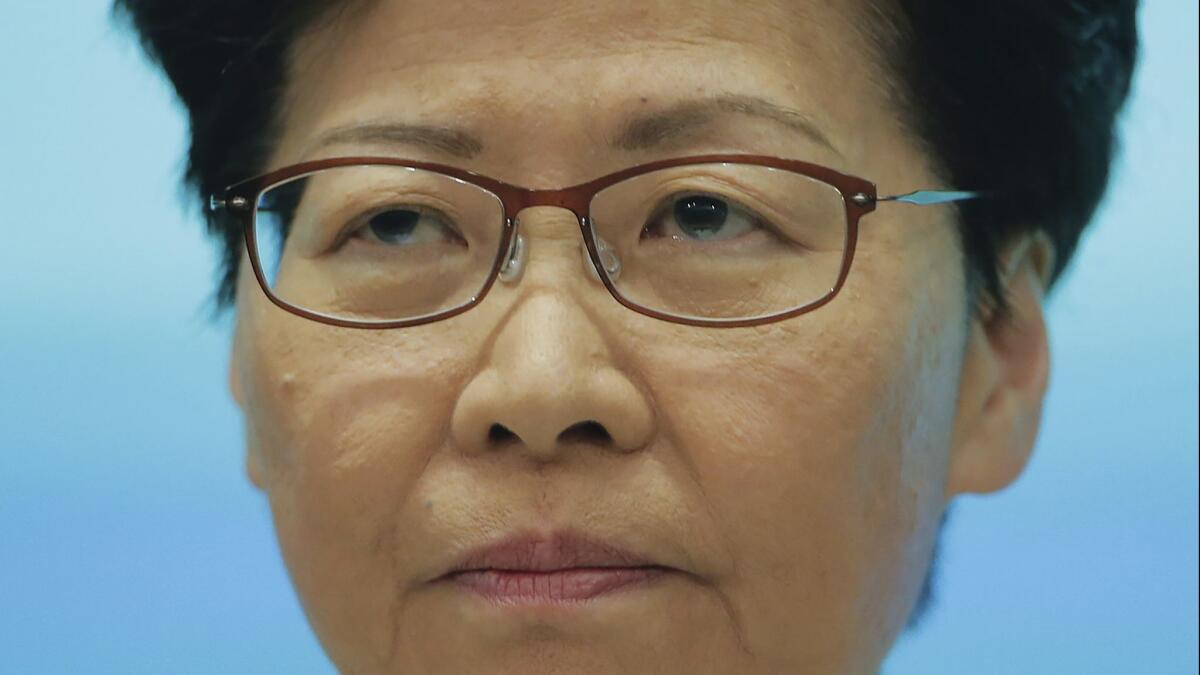Hong Kong’s leader offers her ‘sincere apologies’ but refuses to resign

Reporting from Hong Kong — With her term probably reduced to lame-duck status, Hong Kong’s leader offered her most forceful apology yet for championing a massively unpopular extradition bill, but still declined to accede to the demands of 2 million people who took to the streets Sunday to call for her ouster.
Speaking solemnly at a news conference Tuesday, Chief Executive Carrie Lam acknowledged that the bill — which would have allowed Hong Kong to send people to stand trial in China, but was recently suspended — had triggered conflict and dissatisfaction with her government.
“I personally have to shoulder much of the responsibility,” she said. “For this, I offer my most sincere apologies to all people of Hong Kong.”
Lam, however, declined to submit to the main demands lodged by her critics, including retracting the bill and resigning. The 62-year-old civil servant said she would not revive the legislation as long as it remained unpopular and she would not resign because she wanted “another chance.”
The crisis consuming the city of 7 million highlights Hong Kong’s desire to maintain basic democratic rights enshrined in its constitution, even as China moves to integrate the territory further into its authoritarian system.
It’s also exposed the spectacular miscalculations of a bureaucrat appointed by Beijing two years ago ostensibly to help bridge the fundamental differences between Hong Kong and mainland China.
At each juncture, critics say, Lam failed to anticipate the magnitude of the bill’s unpopularity. It started when she ignored opposition from Hong Kong’s business community shortly after the ordinance was proposed in February — prompting many wealthy individuals to move capital to safe havens such as Singapore.
She was largely silent again when 1 million people demonstrated against the bill on June 9. When riot police fired tear gas, rubber bullets and beanbags at mostly peaceful demonstrators Wednesday, she called the protests a “blatant organized riot.”
The public, however, saw it the other way and were appalled by the police’s heavy-handed response. Lam then held a news conference Saturday announcing the suspension of the bill, but never apologized and blamed the conflict on her government’s poor communications strategy.
The following day, more than one-quarter of Hong Kong’s population took to the streets to repudiate her leadership.
“Carrie Lam is politically illiterate,” said Steve Tsang, a political scientist at SOAS University of London. “She’s never read Machiavelli’s ‘The Prince’ because she would know if you need to make concessions like this, you do it in the beginning and not drip, drip, like this.”
Hong Kong’s leader faces pressure to resign. Will her replacement be any better? »
Anson Chan, who once held the second-highest position in Hong Kong’s government as chief secretary, said the historic demonstrations Sunday were fueled in part by Lam’s inability to convey empathy or sincerity.
“She needs to realize that in politics timing is everything,” Chan said. “It seems that every concession that she’s been willing to make has been dragged out of her.”
So toxic is the extradition bill that China’s ambassador to Britain told the BBC that the legislation was entirely the Hong Kong government’s idea.
“The central government gave no instruction, no order, about the making [of the] amendment,” said Liu Xiaoming, distancing his government from Lam. “This amendment was initiated by the Hong Kong government.”
Lam’s apology Tuesday, while seemingly heartfelt, did little to assuage people’s concerns. In addition to resigning and retracting the bill, critics want Lam to open an investigation into police misconduct during clashes with protesters Wednesday. They also want a promise that demonstrators will not be criminally charged and that the clashes not be designated as “riots,” which has legal significance.
Lam said Hong Kong already has channels to raise complaints about police behavior. On the question of the term “riots,” she deferred to Hong Kong’s police commissioner, who on Monday backpedaled by allaying concerns that anyone who showed up to the protest would be deemed rioters. He said only five participants were accused of the crime.
“She didn’t deliver on the demands,” said Joshua Lee, a 20-year-old journalism student at Hong Kong University who watched Lam’s news conference on a Facebook livestream. “She only made vague statements about government mismanagement, and her apology feels insincere.
“Myself and many other Hong Kong people have lost trust in her administration, and I don’t think she has the ability to continue to be the leader of this city,” he added.
Lam admitted Tuesday that the remaining three years of her term will be “very difficult.” Experts say she’s not under pressure from Beijing to resign because there are no obvious replacements.
Still, observers say Lam would earn some much-needed goodwill if she simply retracted the bill.
“I don’t know why she doesn’t go the whole hog,” Chan said. “She virtually said the bill is as good as dead. With that being the case, why doesn’t she just set people’s minds at ease and retract?”
Chan said Lam isn’t used to backing down, and the last week has been humiliating for the career civil servant who is used to working harder and outsmarting those around her.
“She continues to show this very stubborn streak,” Chan said. “It may be regarded as a total loss of face if she gives in, but this is what the people want. You can’t on the one hand say you’ve listened to the voices of these 2 million people who took to the streets and yet act contrary to their demands.”
Special correspondent Tang Wai Yin contributed to this report.
[email protected] | Follow me @dhpierson
More to Read
Sign up for Essential California
The most important California stories and recommendations in your inbox every morning.
You may occasionally receive promotional content from the Los Angeles Times.











